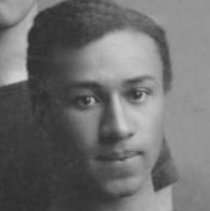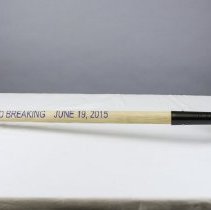Person Record
Images

Metadata
Imagefile |
People\Poage_George.jpg |
Name |
Poage, George |
Other Name |
George Coleman Poage |
Birth Date |
11/6/1880 |
Birthplace |
Hannibal, MO |
Deceased |
4/11/1962 |
Place of Death |
Chicago, IL |
Mother |
Anna "Annie" Poage |
Father |
James Poage |
Occupation |
Track and Field Athlete Athletic trainer for the UW-Madison football team Olympic medal winner High school English and Latin teacher at Charles Sumner High School Farmer (?) Restaurant worker U.S. Postal Service mail carrier |
Role |
Infrastructure |
Education |
University of Wisconsin-Madison - graduated in 1903, degree in history A year of graduate studies, including history, English, and Latin courses |
Places of Residence |
Hannibal, MO La Crosse, WI Madison, WI St. Louis, MO Minnesota Chicago, IL |
Notes |
George Coleman Poage was born in Hannibal, MO to Anna and James Poage on November 6, 1880. In 1884, his family move to La Crosse, WI. When his father, James, and two of his siblings died in 1888, the rest of his family moved into the home of his mother's employers, Mary and Lucian Easton. The Eastons advocated for George's education, giving him unfettered access to books and encouraging his intellectual development. Poage worked hard in school, attending La Crosse High School, and excelled both academically and athletically. A member of the track and field team, he broke Wisconsin's 50-yard state record during his senior year. He ranked second in his senior class, and acted as commencement salutatorian during his graduation in 1899. He was the first African-American to graduate from La Crosse High School. He then attended the University of Wisconsin-Madison, joining the freshman track squad in 1900, then joining the varsity track and field team during his sophomore year. He was the first African-American athlete to run for the University of Wisconsin-Madison, and was one of the team's highest point earners, setting several records. When the team coach was called out of town in 1902, Poage served as a temporary leader of the team. After publishing his senior thesis, "An Investigation into the Economic Condition of the Negro in the State of Georgia During the Period of 1860-1900," Poage graduated with a degree in history. He returned the following year for graduate studies, including history, English, and Latin courses, and served as an athletic trainer for the UW-Madison football team while continuing to run track. In 1904, the Milwaukee Athletic Club sponsored Poage to compete in the 1904 Summer Olympics located in St. Louis, MO. The Olympics were a controversial event, with many African-American community leaders calling for a boycott due to racial segregation of audiences. Poage decided to compete anyway, running in four events. On August 31, 1904, he took third place in the 400-meter hurdle, and became the first African-American to earn an Olympic medal. The next day, on September 1, 1904, he won his second bronze medal in the 200-meter low hurdles. After the Olympic games, Poage chose to stay in St. Louis and become a teacher at the Charles Sumner High School, the first exclusively African-American school of its kind west of the Mississippi, where he taught for nearly a decade. He served first as school principal for a year, then became a teacher and taught English and some Latin, guiding students in theatrical productions, public speaking, and debate, and even teaching Dr. Julia Davis. In 1914, he moved to a farm in Minnesota, but there are no records of him owning the farm, causing historians such as Margaret Lichter and Bruce Mouser to speculate that it once belonged to the Eastons. This period of Poage's life is a mystery to many historians, who aren't sure why Poage left Sumner. Several years later, in 1920, he moved to Chicago, IL, where he worked for 4 years in a restaurant before being hired by the U.S. Postal Service as a mail carrier in 1924. He remained with the U.S. Postal Service until his retirement in 1953, a mail carrier for nearly 30 years. It is believed that racial biases contributed to his inability to find work more related to his educational background, as his education and experience should have afforded him better opportunities. George Poage passed away in Chicago on April 11, 1962. |
Image Caption |
Retrieved from the La Crosse Public Library Archives |
Related Records
-
Commemorative - 2015.021.01
Shovel, purchased at Menard's (sticker is still on back of blade), made in Mexico, and used at the commemorative ground-breadking ceremony for Poage Park, in La Crosse, WI. Blue letters stencilled along handle state: "Poage Park ground breaking, June 19, 2015." Wooden handle is very light colored, probably pine, digging blade is steel with a black finish.
Record Type: Object
